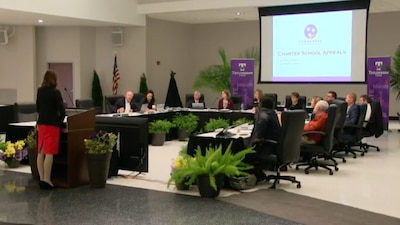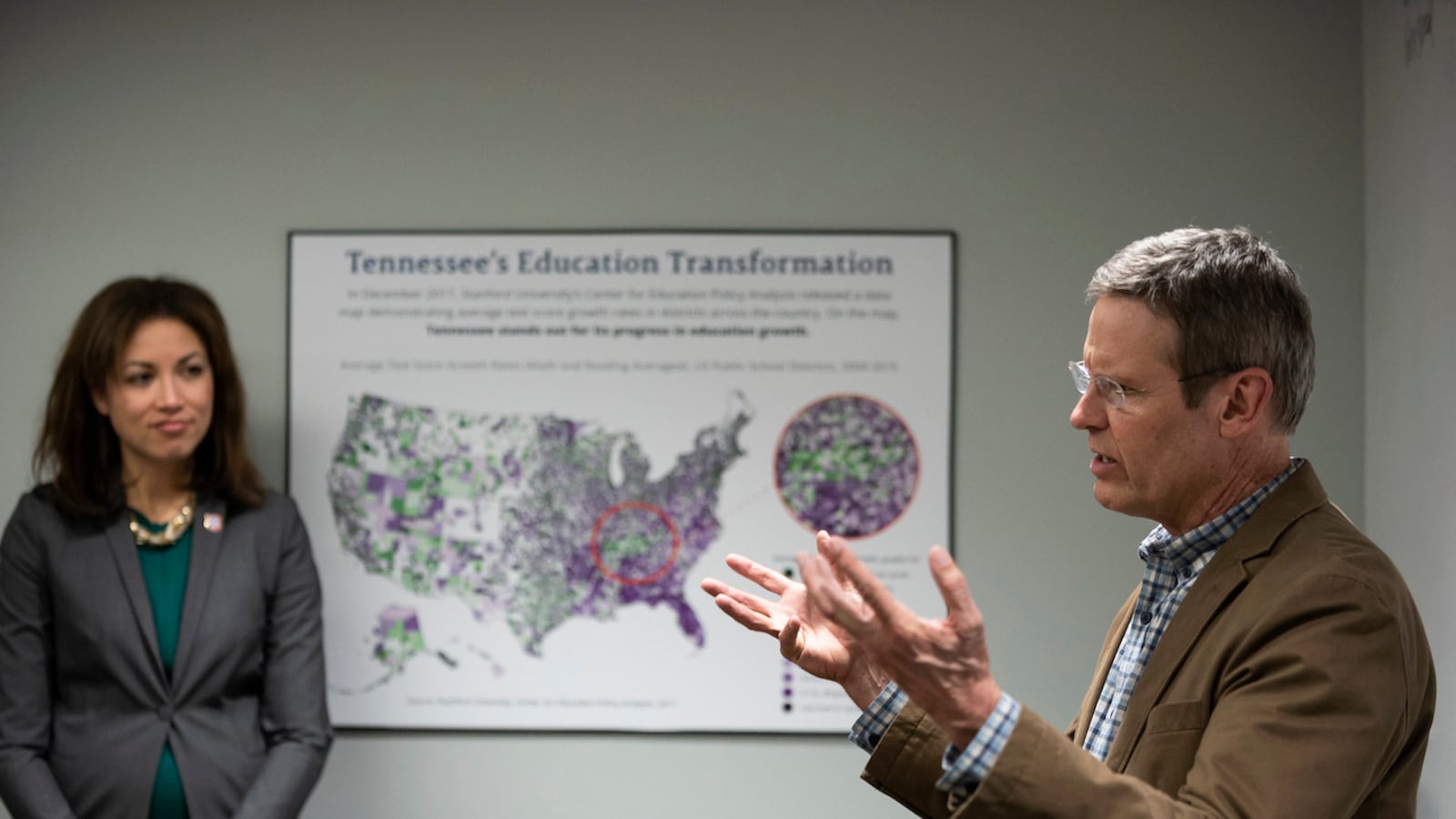Tennessee Education Commissioner Penny Schwinn has raised eyebrows — and ruffled some feathers — by floating possible changes to the way the state judges its schools.
Currently, schools across the state are evaluated heavily on a “growth model,” which measures learning over time, regardless of whether those students are proficient.
Under the possible changes, which borrow from an approach in place in Texas where Schwinn previously served as chief of academics, schools could choose to be judged based solely on proficiency, or how many students meet a certain threshold on state tests.
Such a move — which was on the agendas of two state meetings before being abruptly pulled in recent days — would mark a dramatic change of course for Tennessee, considered a pioneer in using “value-added” measurements to judge teachers and schools.
The possibility has some reform-minded advocates worried that the state could return to an era when schools with many affluent students coasted to top rankings while doing little to show that they were propelling students forward.
“The commissioner’s plan would take us backward and no longer incentivize growth in learning for all students,” worried one knowledgeable source who declined to be identified amid a politically delicate discussion. “Why wouldn’t you want all your kids to grow?”
Critical debate
Debate over growth versus proficiency has been ongoing for decades among researchers and policymakers and took center stage in 2017 when U.S. Secretary of Education Betsy DeVos struggled to answer then-Sen. Al Franken’s question on the difference between the two during her confirmation hearings.
Tennessee was an early adopter of the growth model, partly because of William Sanders, the homegrown statistician and researcher who came up with the nation’s first system for evaluating teachers based on student growth. His “value-added” system uses a complex formula but, according to researchers, provides a robust picture of growth because it compares a student’s performance on state tests with the performance of peers who have a similar testing history.
“The way that accountability has been done historically does not make sense and is out of step with research,” said Dan Goldhaber, who favors a growth model as director of the Center for Education Data and Research at the University of Washington.
To measure teacher effectiveness, for instance, “no credible researcher is going to look at proficiency because you worry about conflating what is the contribution of the teacher with the class assigned to the teacher,” he said. “If you’re talking about an honors class, students most likely will do well but it may not reflect how much a teacher is contributing.”
At times, debate over that approach has been heated in Tennessee, especially in 2011 when the state elevated the statistical growth model from an informational tool to a higher-stakes evaluation system to rate the performance of teachers, schools, and districts. But the controversy increasingly had appeared to be settled as the transition coincided with gains on national tests that earned Tennessee the title as the nation’s fastest-improving state in math and reading in 2013.
“Just grow your kids,” teachers have been told, highlighting the state’s guiding principle that all students can advance, regardless of out-of-school factors like poverty that might hold them back.
Meanwhile, annual surveys showed educators warming to the approach as two previous governors — one Democrat, one Republican — stood by the state’s wonky-sounding growth model called the Tennessee Value-Added Assessment System, or TVAAS for short.
New leader
Recruited to Tennessee this year by newly elected Republican Gov. Bill Lee, Schwinn planned to roll out her first big proposal on Sept. 6 at a state Board of Education meeting after conducting her own statewide “listening tour” and asking Tennesseans for their online input to her department’s strategic plan.
But that meeting was scuttled the day before after slides for her presentation were published on the board’s website. While the details were scant, Schwinn’s presentation appeared to open the door to a “best of” school accountability model similar to the one in Texas, where schools are graded based either on growth or proficiency, whichever is better.
A behind-the-scenes uprising ensued from legislators and various stakeholders who were consulted over the course of a year in developing Tennessee’s current accountability plan in response to the 2015 federal Every Student Succeeds Act, or ESSA. That plan heavily weights growth and earned higher marks than the Texas version from several accountability advocacy groups over its approach for measuring academic progress.

Sen. Dolores Gresham and Rep. Mark White, both accountability diehards who chair the legislature’s education committees, wrote board chairman Lillian Hartgrove jointly to ask for the meeting to be delayed “in order to help us sort through these concerns” and meet with Schwinn “prior to any public presentations.”
Then this week, a state-led session on school accountability was dropped from Monday’s agenda at a statewide superintendents meeting in Gatlinburg.
Schwinn, meanwhile, declined Chalkbeat’s request for an interview. Her spokeswoman said the commissioner wanted to share the information with state board members first.
Lingering questions
The complexity and opaqueness of TVAAS have always been points of contention for Tennessee teachers and school communities that are evaluated partly on those computations. Schwinn likely got an earful from its critics as she toured the state in her first months, especially within higher-achieving districts.
“If you’re a teacher who works with high-achieving students, who also tend to be more advantaged, you’re likely to do well under a measure that’s just based on achievement [proficiency] and would likely choose that metric,” said Goldhaber. “But if you teach lower-performing students, who also tend to be more disadvantaged, you might do better under a system that is based on growth and you would tend to choose that metric.”
The problem with letting districts choose, according to Goldhaber, is that leaders “have a strong incentive to choose the accountability system that reflects well on the school and it increases the chance that everybody would be deemed good or excellent.”
On the other hand, Goldhaber said, “it’s very hard to show gains for a class where all students score at the top of test distribution. So there is this statistical argument for allowing for both growth and a level of achievement as factors in ratings,” which Tennessee’s current model does.
Schwinn alluded to that statistical argument last month when speaking to a group of principals in Hawkins County in East Tennessee about potential changes to the state’s system for rating schools.
“One of the things we’ve heard is that if we are a super high-performing school, it’s really hard to show growth,” she said, introducing the idea of a “best-of model” as a possibility.
Schwinn surprised many, however, with how she described her proposal: “What it’s essentially trying to say is you can’t be high growth and high proficiency. That literally isn’t possible.”
But it is possible.
In Tennessee, several high-achieving schools and districts — in Williamson County, Collierville, Germantown, and Lakeland — all have received top ratings for growth.
Her statement also runs contrary to several principles that have guided Tennessee’s education policies since 2010 when the state made sweeping changes to improve its schools under the federal competition known as Race to the Top, and again in 2016 when developing its ESSA plan.
Goldhaber, considered a national expert on how to measure teacher effectiveness, said growth can be harder with high-achieving schools and classrooms — but it’s not impossible. “I don’t think there’s anything numerically that prevents teachers or schools from being both high growth and high proficiency,” he said.
Cool reception
Before Schwinn’s presentation to the state Board was canceled last week, groups that were actively involved in developing Tennessee’s ESSA plan were open to hearing other ideas for holding schools accountable, but also expressed reservations.
“Tennessee’s ability to use our extensive student growth data to improve instruction, to identify and support low-performing schools, and to tell parents and taxpayers how well their schools are serving all students is the envy of nearly every other state,” said David Mansouri, who leads one of Tennessee leading education advocacy and research groups, the State Collaborative on Reforming Education. “While it’s reasonable to explore improved accountability, Tennessee must stand firm in its commitment to TVAAS and meaningful accountability, only making changes that move us forward.”
Alexza Barajas Clark, a leader with the Tennessee Education Equity Coalition, said Schwinn did not consult her organization about potential accountability changes and expressed concern about any revisions that don’t engage stakeholders, such as the 50 or so civil rights and education advocacy groups that are part of the coalition.
“We have a lot of questions,” said Clark. “We will always bring it back to transparency and engagement, especially with the historically underserved communities that we serve.”
A statement by the state Board, released prior to its scheduled meeting, said members would review any proposal to make sure it’s compliant with state and federal laws and consistent with the state’s blueprint for improving student achievement over the last decade.

“The Board is committed to the path that has led Tennessee to become the fastest improving state in the nation through our improvements in standards, aligned assessment, and rigorous accountability,” the statement said. “We intend to continue that trajectory through our close partnership with the General Assembly, the Governor, and the department of education and by utilizing feedback from Tennessee’s education stakeholders.”
As for the governor, his office skirted the question when asked whether Lee supports opening up accountability systems for revisions that could rely less on growth and more on proficiency.
“Gov. Lee believes that accountability is core to the mission of the Department of Education and the success of our students and teachers,” press secretary Laine Arnold said in a statement. “The administration is committed to measures that provide meaningful information for students, teachers, and families to facilitate solutions for their growth and development.”

